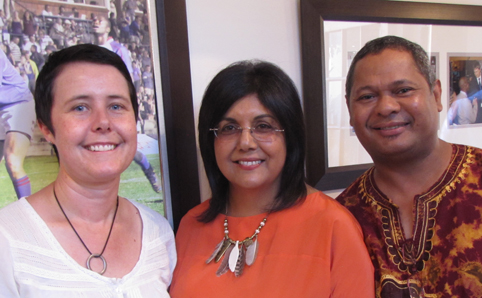Latest News Archive
Please select Category, Year, and then Month to display items
27 October 2025
|
Story Sefako Mokhosoa
|
Photo Supplied
 Ten Grade 12 learners from Mampoi Secondary School in Phuthaditjhaba.
Ten Grade 12 learners from Mampoi Secondary School in Phuthaditjhaba.
On 1 October 2025, the Projects and Innovation Directorate in the Faculty of Education at the University of the Free State (UFS) proudly hosted a certificate ceremony to honour ten Grade 12 learners from Mampoi Secondary School in Phuthaditjhaba on the Qwaqwa Campus. These learners completed a Skills Development Initiative and Workshop Series focused on digital literacy and ICT skills – a programme designed to equip rural youth with the tools they need to thrive in a digital world.
The initiative, which ran from May to August 2025, was made possible through a strategic partnership with BANKSETA to bridge the digital divide in rural communities. The learners received hands-on training in essential digital tools. Each learner also received a tablet to support continued learning and personal growth beyond the classroom.
The Director of the office in the Faculty of Education, Dr Kwazi Magwenzi, stressed that digital skills promote independence and self-directed learning. “Grade 12 is a time when learners should manage their studies, meet deadlines, and explore their options,” she said. “Digital fluency supports that autonomy. It enables learners to use online research, interactive tools, e-learning, and collaboration platforms to make learning more effective, flexible, and aligned with their pace and style. In Grade 12, where the stakes are high – with exams, tertiary entrance, and career choices – this ability helps learners become more self-directed, confident, and equipped.”
The programme not only built learners’ confidence in using ICT tools for learning and communication but also prepared them for the technologically driven environments they will encounter in institutions of higher learning.
Beyond developing digital skills, the project offered learners valuable exposure to the university environment, as their training took place on campus. Inspired by the success of this pilot, the Faculty of Education now aims to expand the initiative to reach more schools and learners across the region. The vision is to scale up access to digital education and empower more young people in rural areas with the skills necessary for academic and professional success.
This ceremony marked the conclusion of a successful training programme and the beginning of a long-term commitment to digital empowerment and lifelong learning in rural communities.
‘We need a story that will excite us all’
2012-03-09
 |
|
Attending the conversation were, from the left: Willemien Marais, Lecturer in the Department of Communication Science; Zubeida Jaffer; and Prof. Andre Keet, Director of the International Institute for Studies in Race, Reconciliation and Social Justice.
Photo: Amanda Tongha
9 March 2012
|
“From the stories of Afrikaner Nationalism and Black Consciousness to the stories of our Constitution and the 1995 Rugby World Cup… But now what do we have?”
This was the question posed by Zubeida Jaffer, recently appointed as the university's Writer-in-Residence. Do we need a new national narrative? was the issue addressed by Ms Jaffer in a talk presented as part of the Critical Conversations series hosted by the university’s International Institute for Studies in Race, Reconciliation and Social Justice. Ms Jaffer is an award-winning journalist and author of, amongst others, Love in a time of treason and Our Generation.
“We can’t change the past and we can’t keep on focusing on separate narratives; we need to find a story, a new national narrative with elements that could excite all of us,” she told an audience consisting of academics and students. She also referred to the changes that took place at the university. “I’m fascinated by what is happening here. It’s mind-boggling to see the changes.” Based on the UFS’ drive to find common ground, Ms Jaffer told the audience that research at universities could and should direct this search for a common South African story.
In reference to her own experiences as a community activist and journalist during apartheid, she urged students to become active citizens. “In my time students were the leaders; they gave direction to the national debate.”
Article (pdf format)